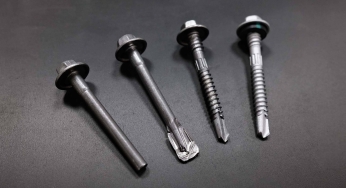With fasteners stocked on long shelves, a walk into any hardware store around Australia is often overwhelming. Ever wondered why some construction would articulate for the use of roofing screws, while others would indicate self-tappers or wood screws? The wrong choice may weaken the joints, cost unnecessary time, and damage your project in the long run.
So, how do you know which screw is best for the job? We will really try to simplify this one and make it practical for you. Soon, you will be able to select the right screw with utmost confidence, aided by a trusted supplier such as Bricon Industries.
Roofing Screws – Built for the Elements
These are specific screws designed to attach roofing sheets to structural frames of timber or metal. Roofing screws do differ from normal screws in that they typically have hex heads with rubber washers, which create a watertight seal. This lets even the most extreme variations of predictable Australian weather – from full-on sunshine to torrential rain – be successful. Roofing screws are the fasteners of choice when installing metal roofing sheets or polycarbonate panels.
Think of climbing onto your roof with a box of standard wood screws – definitely a silly idea. Without the sealing washer, water can seep in, causing leaks and long-term structural problems. And this is why roofing screws have been designed for strength, but, of course, also weather resistance.
Self-Tapping Screws – Versatile and Time-Saving
Ever had something that you wanted to secure to metal and then dreaded the thought of pre-drilling holes? This is where self-tapping screws come in, since such screws cut their own thread while they are being driven in; they work wondrously for saving extra work with pre-drilling. They are also commonly used in sheet metal work, fencing, and light construction projects.
Self-tappers can be classified into two types: with or without a tip (like a nail) or according to a drill point. This pointed tip would be beneficial to a thinner material, while the drill point has a tendency to work very effectively on thicker sheets of steel or aluminium. Typically, use a self-tapper for fence assembly or metal framing, as it is usually the most efficient choice.
Wood Screws – Classic but Reliable
Wood screws have been around for a long time, given their design was made specifically for timber. They are sharp at the tip and have a deep thread on the screw body itself to grip the wood fibres. Whether you are making furniture, fixing decking, or just doing a small repair at home, wood screws have always been the way to go.
A very important factor to take into consideration when using wood screws is to pre-drill them in most cases, especially when working with hardwoods. This way, splitting will be avoided and a clean finish ensured. Softwoods like pine, however, are usually forgiving, but heavier woods sure benefit from drilling a pilot hole.
Conclusion
Then comes the question of which one you should choose: roofing screws, self-tappers, or wood screws? The answer varies based on your material and environment. Roofing screws should be used for areas exposed to the weather; self-tappers shine their brightest with metal, and wood screws are the go-to fastener for timber work.
Next time you consider planning a job, think really hard about which screws to use for that application. When screws of superior quality need to be acquired, use a respected supplier to guarantee your supply of the right product all the time.



